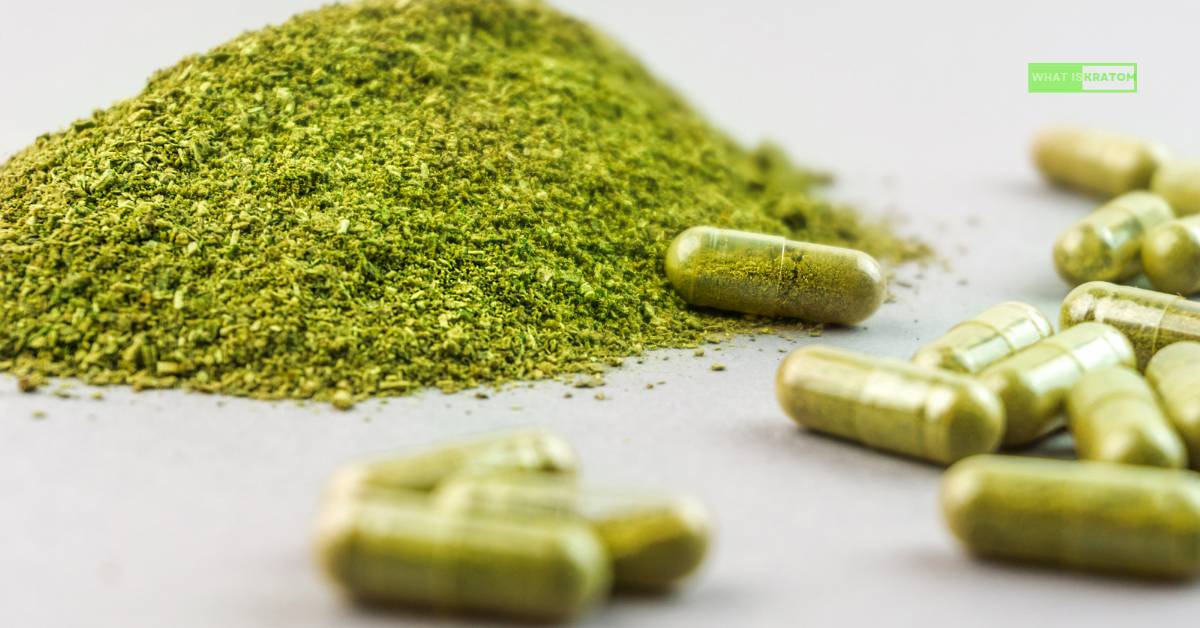Kratom is a natural plant-based substance derived from the leaves of a tropical tree in the coffee family native to Southeast Asia. It has been used for centuries for its medicinal effects and is increasingly gaining popularity in the U.S. as an alternative to opioids for managing pain. While kratom has long been considered an opioid, recent research suggests that it may not be one in the traditional sense. This article will explore the debate around kratom and its potential effects on opioid addiction.
Is Kratom an Opioid? A Look at the Controversy
Kratom has recently been thrust into the spotlight as a potential opioid alternative. But is it truly an opioid? The answer to this question is not a simple one and remains a source of controversy.
On the one hand, some experts claim that kratom affects the same brain receptors as opioids and can provide similar pain-relieving effects. Others point out that while kratom does affect opioid receptors, it does so differently than prescription opioids and is, therefore, not an opioid itself.
The debate over kratom’s status as an opioid is further compounded by the fact that some of the compounds in kratom, known as alkaloids, can also affect other neural pathways, such as those involved in mood regulation. This further complicates the question of whether kratom is an opioid or not.
At the moment, the evidence is inconclusive. Some studies have suggested that kratom can provide relief from certain types of pain and reduce opioid cravings, while other studies have found that kratom can have dangerous side effects, including nausea and depression.
Ultimately, the debate over whether kratom is an opioid or not is likely to continue until more conclusive scientific evidence is available. In the meantime, it’s important to remember that kratom is not a substitute for opioid medications and should not be used in their place of them.
Exploring the Medical Uses
Kratom (Mitragyna speciosa) is a tropical evergreen tree native to Thailand and Southeast Asia that has recently gained popularity in the West for its purported medicinal properties. While some people claim that kratom can help treat chronic pain, anxiety, and depression, it is important to note that there is currently a lack of research to support these claims.
The active compounds in kratom, called alkaloids, interact with opioid receptors in the brain, providing a range of effects, including pain relief, euphoria, sedation, and stimulation. While some individuals have reported that these effects are beneficial, there is little evidence to support the long-term safety and efficacy of kratom for medicinal use.
Kratom is currently not regulated by the FDA, and there are potential health risks associated with its use. It is known to be addictive, and users may experience withdrawal symptoms if they stop taking it abruptly. Additionally, there is a growing body of evidence suggesting that kratom can interact with other medications, increasing the risk of side effects.
Given the lack of research and potential health risks associated with kratom, it is important to consult with a healthcare professional before taking it. While kratom may have some beneficial effects, it is important to remember that more research is needed to understand its full potential.
The Opioid Crisis and Kratom: What We Know
The opioid crisis has been making headlines for years now, and it continues to wreak havoc on communities around the world. In recent years, a new substance has been gaining attention as a potential alternative to opioids for pain relief and other therapeutic uses. This substance is called Kratom.
Kratom is derived from the leaves of a tree native to Southeast Asia and is known for its stimulant effects. While some users report that it helps with pain relief, anxiety, and depression, there is still much that we don’t know about Kratom.
First of all, there is a lack of research on the long-term effects of Kratom use. We know that it can act as a mild stimulant, but we don’t know if it has any other effects. Additionally, there have been reports of Kratom leading to addiction and even death. It’s important to note that these reports are largely anecdotal and not backed up by scientific research.
Furthermore, it’s unclear how Kratom interacts with other substances, including prescription medications. While it’s possible that Kratom could provide a safe alternative to opioids, it’s important to note that there is still a lot that we don’t know about it.
Overall, it’s clear that more research is needed before we can make any definitive conclusions about Kratom and its potential role in treating the opioid crisis. Until then, it’s important to be aware of the risks and proceed with caution.
Are Kratom Supplements a Safe and Effective Treatment for Opioid Withdrawal?
The use of kratom as a potential treatment for opioid withdrawal has become increasingly popular in recent years, but there is still much to learn about the safety and effectiveness of this supplement. While some proponents of kratom claim that it can help ease the symptoms of opioid withdrawal, there is a lack of reliable scientific evidence to back up these claims. Furthermore, there are concerns about the potential for kratom to be misused and abused, as well as potential long-term side effects.
While there have been some reports of kratom being helpful in reducing opioid withdrawal symptoms, most of these reports are anecdotal. To date, there have been no well-designed controlled studies to investigate the effectiveness of kratom for opioid withdrawal. Without rigorous scientific evidence, it is difficult to draw any conclusions about the safety and effectiveness of kratom as a treatment for opioid withdrawal.
In addition, kratom can be easily misused and abused. The active compounds in kratom have psychoactive effects, and the drug has been linked to several deaths across the U.S. Long-term use of kratom can also lead to addiction and withdrawal symptoms.
Given the lack of scientific evidence and the potential for misuse and abuse, it is difficult to recommend kratom as a safe and effective treatment for opioid withdrawal. While there may be some potential benefits, the risks associated with the drug are simply too great to recommend its use without further research.
Exploring the Benefits of Kratom for Opioid Withdrawal Symptoms
Kratom has recently become a popular alternative for those struggling with opioid withdrawal symptoms, but is it really helpful? Despite the claims from many users, the scientific evidence is limited and more research is needed before it can be considered a viable treatment option.
Proponents of kratom claim it helps reduce cravings, improve energy levels and even ease depression. Kratom is derived from the leaves of the Mitragyna speciosa tree, which is native to Southeast Asia. It contains alkaloids that are said to provide pain relief and produce a mild, euphoric feeling.
However, the FDA has warned against the use of kratom, citing potential health risks associated with long-term use. These risks include addiction, liver damage, and respiratory depression. Additionally, there have been several reported deaths due to kratom use.
It is also important to note that kratom is not regulated by the FDA, which means it can be contaminated with other substances or lack quality control. Furthermore, while kratom may help with some opioid withdrawal symptoms, it does not address the underlying causes of opioid addiction.
Ultimately, more research is needed to determine the effectiveness of kratom for opioid withdrawal symptoms. Until then, it is important to be cautious and discuss all treatment options with a healthcare professional.
Understanding the Side Effects
Kratom is gaining traction as a potential aid in helping opioid addicts recover from their addiction. However, the side effects of using Kratom for opioid withdrawal are still largely unknown. While it’s true that Kratom seems to help some people manage their opioid withdrawal symptoms, the long-term effects and safety of Kratom use is still uncertain.
Proponents of Kratom argue that it can help addicts manage painful withdrawal symptoms, such as anxiety and depression. They also claim that Kratom is a safe way to manage opioid addiction since it is not addictive itself. However, there is no scientific evidence to back up these claims.
It’s important to note that Kratom does come with side effects. These can range from mild to severe and can include nausea, headaches, sweating, and insomnia. In some cases, Kratom can cause serious heart problems. Additionally, if Kratom is mixed with other drugs, it can be dangerous.
Given the lack of research on the long-term effects of Kratom, it’s difficult to make a definitive statement about its safety. While it may be helpful for some people, it’s important to remember that there are still unknown risks associated with its use. Before using Kratom for opioid withdrawal, it’s important to consult a qualified healthcare professional.
Potential Interactions
The debate around kratom as an effective treatment for opioid withdrawal has reached a fever pitch. While some proponents of the botanical supplement tout its potential benefits, many medical experts are skeptical, citing a lack of scientific evidence to support these claims. Now, rising concern over potential interactions between kratom and opioid medications for withdrawal is adding to the controversy.
At its core, the issue is complex. Kratom is a psychoactive substance derived from the leaves of a Southeast Asian tree. It has been used for centuries as a remedy for pain, fatigue, and other ailments, but more recently, it has found particular popularity among individuals battling opioid addiction. Many swear by its ability to ease opioid withdrawal symptoms and reduce cravings.
But the reality is that there is not enough research to back up these claims. And this lack of reliable information leaves many vulnerable to potential interactions between kratom and opioid medications.
To make matters worse, the active ingredients in kratom are still poorly understood. For example, it contains a chemical called 7-hydroxy mitragynine, which is believed to be an opioid receptor agonist. This means it can bind to the same receptors as opioid medications, potentially leading to serious side effects.
The bottom line is that more research is needed to determine the efficacy and safety of using kratom for opioid withdrawal. Until then, anyone considering using kratom should be aware of the potential risks and talk to their doctor about any potential interactions with opioid medications.
Conclusion
In conclusion, while kratom does contain some opioid-like compounds, it is not an opioid drug like morphine or oxycodone. Kratom can have some opioid-like effects, but it does not act on the same brain pathways as traditional opioids. There is still much research needed to understand the potential risks and benefits of kratom, but it is clear that it is not an opioid.






